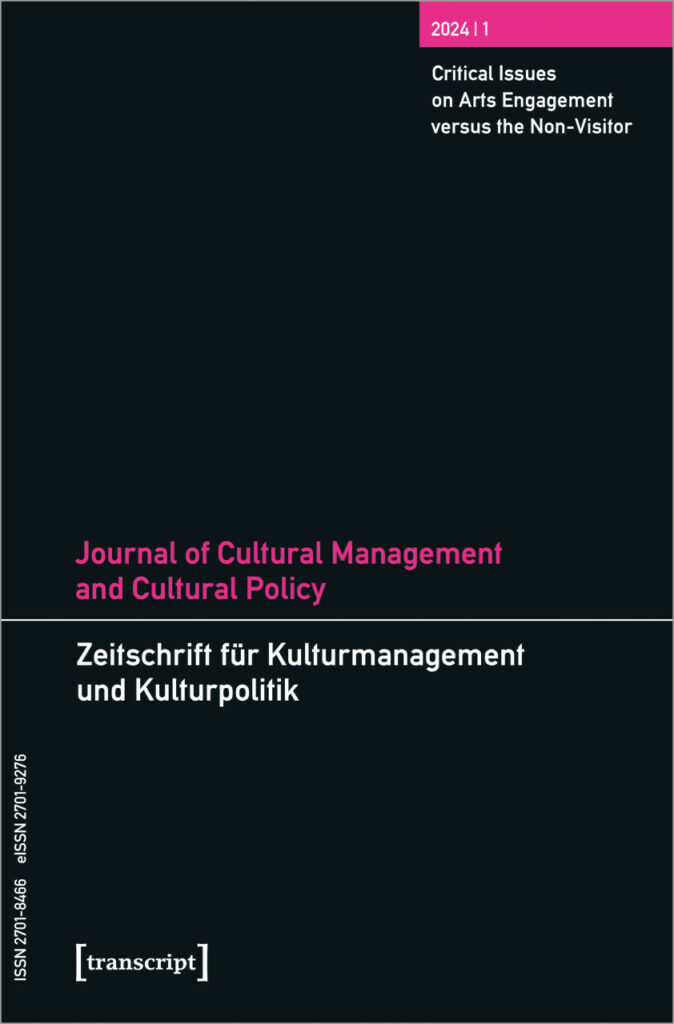Research Article
Financial Implications of Engagement Between Higher Education Institutions and Professional Nonprofit Theatres in New England
Abstract
The purpose of this study is to test whether nonprofit theatres in New England that are engaged with higher education institutions (HEIs) have increased revenues over those that are not. Besides revenue, the study also tests two additional measures of financial well-being: expense-to-revenue ratios, and employee-cost-to-total-expenses ratios. The results showed that theatres that had discernable HEI engagement have greater total revenue and lower expense-to-revenue ratios over theatres that did not. Notably, regardless of the size of the theatre, those with discernible HEI engagement operated, on average, with a surplus. Conversely, theatres with no discernible HEI engagement operated, on average, with a deficit. The study found no difference in employee-cost-to-total-expense ratios. Resource Dependence Theory is used to explore why engagement with HEI’s may improve the financial status of nonprofit theatres. The implication of these results through a resource dependency lens is that HEI engagement creates paths to increase total revenue and reduce expense-to-revenue ratios of nonprofit theatres.
Keywords
2024 (1)
Critical Issues on Arts Engagement versus the Non-Visitor

Related Articles
Journal of Cultural Management 2015 (2)
Research Article
Retooling for the Revolution: Framing the Future of Museum Management After COVID-19
Journal of Cultural Management and Cultural Policy
Essay
The Influence of Political Engagement on Artistic Reputation. Self-Evaluations of Artists
Journal of Cultural Management and Cultural Policy
Research Article
Crowdfunding
Neue Finanzierungsform für kulturelle Projekte oder Medienhype?Journal of Cultural Management 2015 (1)
Research Article
Das Theaterpublikum
Veränderungen von der Aufklärung bis in die GegenwartYearbook for Culture Management 2012
Research Article
Yearbook for Culture Management 2013
Essay
© 2026, Journal of Cultural Management and Cultural Policy
Keywords
- Aesthetics
- Higher Education
- Cultural Diplomacy and Foreign Cultural Policy
- Occupation
- Career and Professional Role
- Audience Development
- Audience Studies and Visitor Studies
- Visitor Motivations
- Business
- Covid Pandemic
- Democracy
- Digitalization
- Diversity
- Third Sector
- Empirical Aesthetics
- Development
- Ethics
- Evaluation
- Field Theory
- Festival
- Film
- Federalism
- Community Arts
- Societal Change
- Ideology
- Staging
- Career
- Communication
- Concert
- Creative Industries
- Creativity
- Crisis
- Culture
- arts organizations, cultural organizations
- Cultural Participation
- Cultural Change
- Fincancing The Arts
- Cultural Promotion Law
- Cultural History
- Cultural Management
- Cultural Economy
- Cultural Organizations
- Art Education
- Cultural Policy
- Cultural Production
- Cultural Sociology
- Art Education
- Cultural Understanding
- Arts Administration
- Cultural Industry
- Cultural Sciences
- Art
- Art Field
- Arts Research
- Artists
- Artistic Research
- Artistic Reputation
- Arts Management
- Arts Organizations
- Art education
- Arts Marketing
- Arts Administration
- Curating
- Leadership
- Literature
- Advocacy
- Management
- Marketing
- Market
- Media
- Methods Development
- Mexico
- Monumentalizing
- Museum
- Music
- Non-Visitor Studies
- Opera
- Orchestra
- Organization
- Political Expression
- Post-truth Politics
- Professional Role
- Audience
- Audience Development
- Law
- Government
- Role
- Socially Engaged Art
- Social Cohesion
- Social Change
- Social Cohesion
- Non-visitor Socio-demographics
- Socioculture
- State
- Symbolic capital
- Dance
- Participatory Justice
- Theatre
- Theatre Governance
- Theory Development
- Tourism
- Transformation
- Survey
- Entrepreneurship
- Urbanism
- Civil Society


